TUCO Health Seminar: Lecture on the larynx and the voice
Lecture by ENT Surgeon, Dr. Solaiman Juman
September 08, 2018

Dr. Solaiman Juman, ear, nose and throat (ENT) surgeon
Today we are going to talk about the larynx and the voice. At the end of the talk, what I hope is that you all understand a little bit more of how sound is produced, what are the problems that could happen with the voice box and how you can prevent the problems.
Structure of the Voice box and how it works:
The voice is the oldest musical instrument. Sound is just the vibrations. When I speak, there are particles in the air that vibrate and these transmit sound near to your ear. If there was a vacuum, you would not be able to hear anything.
For us to produce sound we need three parts. One, the lung which is the generator, the second one is the voice box which is the vibrator and the third one is the tongue, the teeth, the lips, the gums, they are the articulators.
The lung produces air, the air comes up, it reaches the voice box and then the voice box starts to vibrate. It’s just like if you pluck a string on a guitar and that starts to vibrate. That sound then comes up to your mouth which changes the sound into words. I am sure you all know that from a practical point of view. But from a medical point of view, if you have a voice problem, you have to look at all those components.
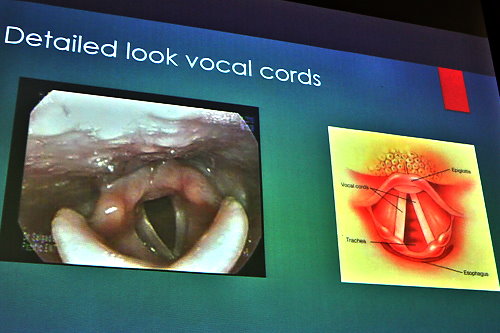
Detailed look at vocal cords
Now, a little more detail about the voice box. The sound is from the lungs, the vocal cords vibrate and then it comes up to the mouth. We can look at the voice box with a little telescope that goes in through the nose and down the throat. When you are singing or talking, your vocal cords move in and out and that’s one of the things we have to look at. We want to see them moving symmetrically and we are also looking at the appearance of the larynx. When it is clear and white that is normal. The other thing we are looking at is the edges. When you are talking, to get a good clear voice, the edges must meet straight in the middle. If there is anything blocking it, you are going to have a hoarse voice. That is one of the causes of hoarseness. Once it is irregular and air is allowed to escape, you get a hoarseness.
The technical name for hoarseness is dysphonia. When you come to us, we want to know if the hoarseness is there all the time or if it comes and goes. It is more serious if it is there all the time. Once you tell me sometimes your voice is good and sometimes it is not that well, then maybe it is not too serious. But if you tell me that for the past six months your voice was hoarse, then something serious is going on. How much are you using your voice as a singer? Are you over using or abusing your voice? Do you have to sing where there is a lot of back ground sounds? Do you shout a lot?
When we exam you, we do a full examination. Some people are concerned about passing the telescope through the nose and would ask why we don’t pass it through the mouth. But there is a very good reason. You can bite it. Although it is a little uncomfortable, it is the safer thing to do.
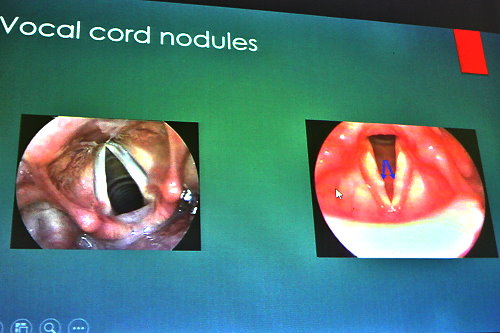
Vocal cord nodules
Common causes of Hoarseness:
This is a classic thing you see with teachers. When the term starts, they are ok, but as the term progresses, they get more and more hoarse. A normal voice is when the two edges of the vocal cords are nice and clear. If there are little bumps, when you try to bring your vocal cords together, those bumps keep it apart a little bit and you are going to be hoarse. Those are called vocal cord nodules. The simple way you can think about what vocal cords nodules are, it’s like if you are wearing a tight shoe and you get a callous. It’s like a callous on your vocal cord. So instead of using your vocal cords nicely, you are banging away and using your voice badly.
Another thing that probably most people do not understand. Everyone can speak, and everyone can sing, but not everyone does it for a living. Just like Brian Lara has to play cricket every day or Usain Bolt has to run every day, they have to train to do it. If you have to use your voice a lot and you don’t have either voice training or speech therapy, you can end up using your voice in the wrong way, using the wrong muscles. A lot of people don’t do voice training or speech therapy. This is a simple way to think of it. When you want to raise your voice, as most people do, they force it and that is when you get nodules. If you want to raise the intensity of your voice, you should take a deep breath in and then it comes from the lungs.
Once you identify the vocal cord nodules, I tell patients that they need to have at least two weeks sick leave to rest their voice completely. So speech therapy and voice rest, good choice. We don’t like to operate because it can be treated medically. It’s the same thing that happens with the polyps or vocal cord, swollen from over use of the voice. The lesions we would be concerned about is when you only have it on one side. We have to make sure it is not a cancer. All the little blood vessels on the vocal cords, one day if you shout or use your voice too much, it is going to burst and you will get a Haemorrhagic polyp. That one will be surgically removed. You can do the right things and catch this early.
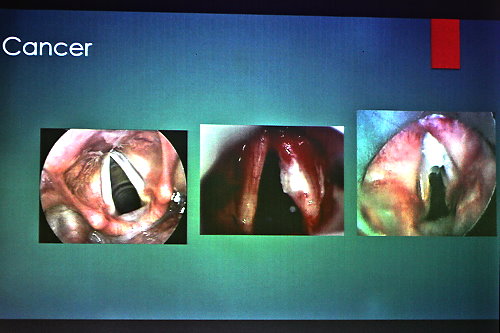
Cancer
Unusually, hoarseness could be due to a virus causing a weakness of one of the vocal cords. If the vocal cords move asymmetrically you will get a lot of breath escaping and the voice will be very husky. That is called the vocal cord palsy. The first thing you have to do is find out why you have it and if it is irreversible. If it does not resolve spontaneously there is a surgical procedure where we can bring the other vocal cord next to the middle, so you can still get a decent voice.
There is nothing like a natural husky voice. There is something going on in the vocal cord. You may have it not because of cancer, but you may have it because of the way you talk. There was an actress a few years ago who would go and scream at the top of a hill for hours and hours to get nodules so she would have a deep husky voice. Some singers have husky voices because that is the way they want to sing. Once you know it is not a cancer, and persons are happy with it, it’s ok. But it is not normal.
Anyone with a long history of smoking and husky or hoarseness of the voice, should stop smoking and rest the voice and if after one month your hoarseness doesn’t go away, you should go to an ENT specialist. If you look at the voice box and you see white stuff and irregularities, that’s a cancer until proven otherwise. The patient will have to go in as soon as possible for us to take out some of the tissues and send it to the lab for testing. If it comes back as a cancer, cancer is not necessarily a death sentence. Once you pick it up in the first two or three stages and go for radiotherapy, you can be cured. It’s when you get the hoarseness and you are not seeing anybody after six weeks, six months or a year and the tumour is growing, that’s when you get the problem.
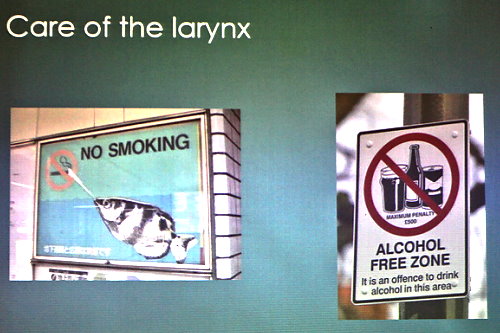
Care of the larynx
Care of the Voice box:
How do you care for the larynx? Prevention is better than cure always, in anything. No shouting, it is not good, it really causes a problem. Believe it or not, whispering is as bad as shouting. When you whisper, you have to tense the vocal cords a lot. When I tell a teacher or a singer to rest their voice, it’s no shouting, no singing, no whispering. The only two words you should be saying if you are going for absolute voice rest is “HELP” and “FIRE”. If sometimes we send you to speech therapy, the speech therapist will go through how to use the right muscles and how to use the lungs to produce sound.
I am clear in my mind and I am unashamedly anti-smoking. Smoking does no good for anything. It is proven that it has many harmful effects and the worst-case scenario is cancer. When you see somebody with possible cancer of the larynx, you have to look at the lungs because they may have cancer in the lungs as well. Smoking is no good!!!
Now, alcohol is also a problem. If you are going to drink alcohol, we suggest that you should not drink it at night because of the acid production in your stomach when you are sleeping. Once you are aware of the mechanism of how these things work you can then start to see how you can modify your lifestyle. Drink lots of water, it keeps your vocal cords well hydrated. Some of you may realize it, but if you drink a lot of water, you feel a certain fullness in your voice.
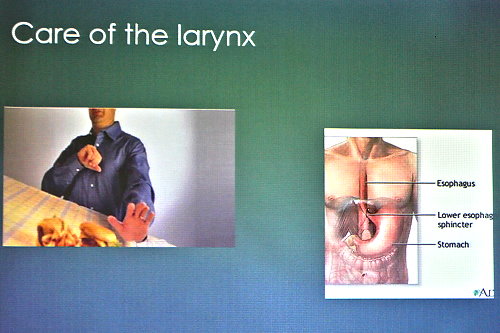
Care of the larynx
Once you put on weight it contributes to acid reflux which is a big negative factor. One famous voice surgeon said if you are treating hoarseness and you do not treat reflux, it’s like going to a fire without water. Most of you know about reflux where there is burning and indigestion. But there is another type of reflux and that is the more dangerous type for the voice. There are people who have no burning and no indigestion, but the acid comes straight back up and it comes straight to the voice box. Those are the patients that I see. It comes back again to what you eat, when you eat and how you eat. Avoid pepper and curry. If you are going to eat this, everything in moderation. You can have a little for lunch but not in the night. I can tell you, if you eat curry duck at 11 o’clock every night you will get hoarseness eventually. It is how you eat, what you eat and when you eat it. Curry and alcohol are a big problem in the night.
If you know that you have a big show and you are performing at 11 o’clock, if possible, try not to wait to eat after 11 o’clock. Have something before you go to perform so that after you perform you don’t have a big meal and then lie down to sleep. The critical thing is you need to take a last meal in the night three hours before you lie down because that is about how long it takes for your stomach to empty. When you are lying down you must sleep with your head up. You need to sleep on about two pillows. You need to raise your head about six inches.
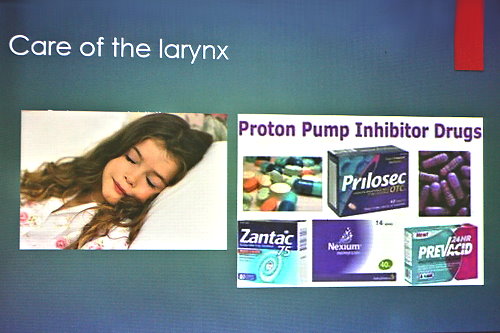
Care of the larynx
For those of you who have arthritis in the Spine and can’t sleep on pillows, what you need to do is put two six-inch blocks under each leg at the head of the bed, so the bed is tilted up and your neck would not get pressure. If that fails, then you need to go on medication. Zantac is alright, but you need to use things like Omeprazole which comes in many different forms. I have seen patients who needed to go on this for up to six months. For example, when patients are on medication, they are better, but when they come off the mediation the problem comes back. That’s when you may have a patient for surgery and it is not vocal cord surgery, it’s surgery to control your reflux. This is a lifestyle issue and once you know what the right things are and know the things to avoid, you can control a lot of the voice issues that you could experience in your life time.
The other thing is if you have a virus. I am sure lots of artistes cancel a show because they have a cold. If your vocal cords are inflamed and you force it and try to sing, you can turn something which can be solved with one week of rest into six months of hardship. Rest is such a critical thing and once you pick up a problem, deal with it as soon as possible before it becomes another problem.
There was a famous calypsonian who was a little superstitious. He didn’t want me to pass the telescope into his larynx because he thought I would damage his larynx.
No, we are not going to damage the larynx. If you get a bad cold and you get a hoarseness, that is called acute laryngitis. If you come to me in the day to say you want to perform in the night, I am going to tell you no. There is no magic formula to this. There are cases where people asked about injecting steroids in the vocal cords, but that could end up in long term damage so it is not something we recommend. Try to avoid surgery to the vocal cords as much as possible. Only in bad cases or cases where you think it might be cancer where we have to go in, because every time you operate on the vocal cords you get a lot of scarring.

Care of the larynx
One of the early symptoms I get in patients who have acid reflux is that you cannot make the high notes. As you get older and you get a little more reflux and the vocal cords start to tickle, you may realize that you can’t do high notes like you used too. Sometimes it can just be the control of the reflux and sometimes it could be age. This is another problem that can happen as you get older. Just like how the muscles get weak, the vocal cord muscles can get weak as well, so sometimes you may get a weak voice. There are things you can do for that to plump it up a bit and that is a little injection of a certain material but there is not a big demand for that in Trinidad.
We are hoping to get more doctors to specialize in Ear, Nose and Throat surgery so that you can get someone sub-specializing in the care of your voice.
The voice as I said, is the original musical instrument. Plenty people learn to play the guitar, but to master the voice, very few people can do that. You are in control of what you can do. If you do the right thing you can maintain your voice for a long time.
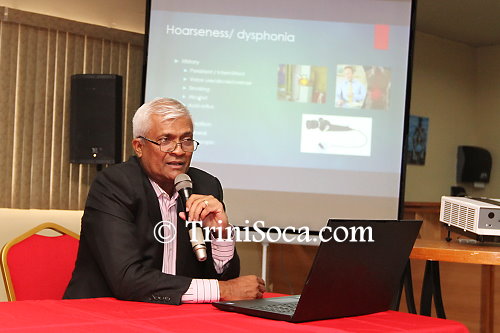
Dr. Solaiman Juman, ear, nose and throat (ENT) surgeon
Questions from audience:
What is the relationship between thyroid surgery and the voice?
The other kind of surgery that can sometimes affect the voice is thyroid surgery. Right under the thyroid gland, the two nerves that tell those muscles to move, they lie right under it. Depending on how much the tumour and the nerve is tied up, sometimes when you are doing the surgery, the nerve might get weak. Those patients tend to have a husky voice, but it is not common. I would say it happens in maybe about two percent of thyroid surgeries. If you operate on a hundred patients with thyroid problems, ninety-eight would be fine but maybe about two of them might get a husky voice.
What about home medicine and the voice?
Taking hacks or power mints will not affect the anatomy or the physiology. What it does is it changes the sensation. It makes you feel better. There is no research whatsoever that says drinking honey will give you a better voice, similarly, people with reflux. People take apple cider vinegar when they have acid in their stomach. I don’t know where that came from, but apple cider vinegar is acidic, so I don’t know how that can work. There is no medical research that says it does.
Coffee has caffeine in it and caffeine stimulates acid production. People ask about things like herbal tea. Once it doesn’t have caffeine in it it’s ok because some people will drink three cups of tea a day. If it is normal tea, it has caffeine in it and the caffeine will stimulate acid production. I allow like one cup of tea in the morning and maybe you could have a little herbal tea at around 4pm. Some people drink a cup of tea to go to sleep. That’s not good because tea has caffeine in it and you are going to sleep with the caffeine in your stomach, stimulating acid. You shouldn’t be drinking anything apart from water after your dinner. When you go to sleep, your stomach should be empty. Six glasses of water a day once your kidneys are working should be no problem but if it is malfunctioning then that changes the whole equation. Generally, you need to keep your health as good as possible and you can’t go wrong with natural fruits and vegetables. Avoid processed stuff as much as possible.
TUCO Health Seminar 2018 in pictures:
www.triniview.com/gallery/main.php?g2_itemId=880845